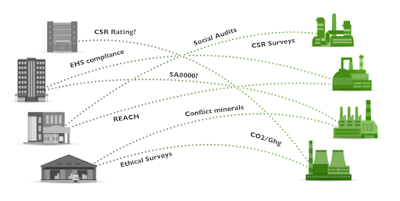Before the United Nations Global Compact Leaders Summit in New York City June 22, a pre-conference roundtable session on supply chain sustainability was held at the UN Headquarters. This workshop brought together Global Compact LEAD companies and other members convened to define and bring urgency to sustainable procurement, and to discuss how they can motivate and mobilize their companies to address this next frontier in Corporate Social Responsibility (CSR) progress.
Companies present came from diverse industries including pharmaceutical, chemical, consumer goods, industrial, construction, legal as well as a Brazilian provider of organic ingredients for cosmetics who brought with them a supplier’s perspective. EcoVadis Senior Account Executive Daniel Perry was invited by UNGC to present, and has reported here on the discussions and outcomes of the workshop.
During the discussion, the group agreed that while a “sustainable supply chain is hard to define”, an unsustainable supply chain is very easy to recognize, in part because companies immediately see the revenue and brand reputation impacts of human rights violations, environmental damage and ethical transgressions.
Questionnaire Fatigue
Supplier questionnaire fatigue came up several times, as suppliers invest considerable time responding to multiple client requests for compliance data, and not enough time actually improving their operations. Lack of education and poor guidance strategy can result in an inverse correlation of self assessment results compared with on-site audits, as the less sophisticated suppliers respond hastily with the answers they think their customers want to see, and suppliers with robust management systems take time to respond with an accurate status of their operations.
Capacity building
Capacity building is the actionable path to meaningful change, but requires focus on both supplier capabilities and the capabilities of internal procurement departments, as the job of implementing sustainable procurement policies falls upon the buyers and purchasing managers. Today, a lot of procurement departments are still focused heavily on (and rewarded for) the traditional procurement metrics of cost, quality, on-time delivery. While you could easily add “sustainability” as a new metric to the list, without internal capacity building, this may lead to confusion, misunderstanding, and may fail to reduce risks. Procurement and the Sustainability/CSR teams must develop change management strategies to communicate the immediate and long-term sustainability implications – both costs and benefits – and translate the acquired data into actionable decision making..
Government Expectations Can Drive Global Supply Chain Sustainability
EcoVadis Senior Account Executive Daniel Perry presented on trends in sustainable procurement, including the need for mutual recognition to help simplify supplier assessments and reduce questionnaire fatigue, the continual stream of new government and non-government data sources, and the dramatic increase in CSR/Sustainability related laws and standards. To bring context to the discussion, visualizations of supplier sustainability rating statistics were presented. EcoVadis evaluates the sustainability and CSR management systems of over 25,000 companies globally, providing shareable scorecards that display overall ratings out of 100, and theme scores for Environmental, Social, Ethical and Supply-Chain management systems. For the purposes of presentation, the focus was on the average CSR performance ratings of thousands of companies from the UK, France, Germany and the US, and in particular, their sustainable procurement/supply-chain theme sub-scores. Even when the UK companies’ strong overall score (47) was taken into account, digging into the theme scores revealed that UK companies’ average Supply-Chain (“SUP”) score was significantly higher than those of its peer countries (41 vs an average of 36 elsewhere). This highlighted an interesting correlation with the fact that the UK has the strongest and most publicized supply chain responsibility laws currently in place (UK Bribery Act, and UK Modern Slavery Act).
From inward to outward: A sense of urgency driving CSR progress
There was a sense of urgency in the room for these CSR leaders, as they realized they must find ways to broaden the approaches for managing sustainability practices to include their supply chains: Many companies’ CSR activities are focused on their own internal company operations, and are well developed in this regard, but their biggest opportunity to impact global sustainability is to shift focus to their external impacts. This workshop revealed a clear awareness by CSR leaders that their challenge is to take ownership of all CSR-related business practices, engage the procurement and supply chain teams within their companies regarding the critical nature of sustainable procurement, and seek the tools and processes to do so quickly and efficiently (for both the companies and their suppliers).
The UNGC staff brought the feedback of the workshop into their leadership summit, and we are excited to see where this supply chain initiative will lead over the coming months.
Reporting by Daniel Perry
Senior Account Executive at EcoVadis
What to read next
























